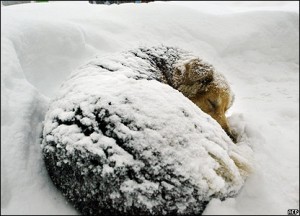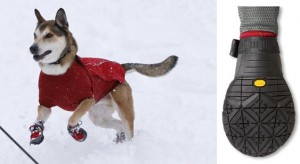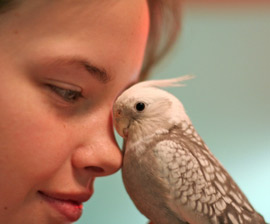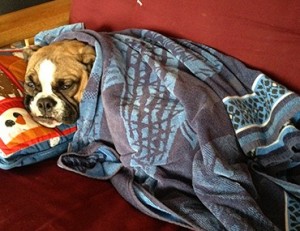 It’s a common belief outside of the pet health industry that dogs and cats can tolerate cold weather because of their fur, but make no mistake, pets can get frostbite, too. The good news is, cold weather injuries are the easiest to prevent.
It’s a common belief outside of the pet health industry that dogs and cats can tolerate cold weather because of their fur, but make no mistake, pets can get frostbite, too. The good news is, cold weather injuries are the easiest to prevent.
A pet’s cold tolerance can vary from pet to pet based on their coat, body fat stores, activity level, and health. Be aware of your pet’s tolerance for cold weather, and adjust accordingly. (For instance, our Greyhound must have a sweater any time it’s below 50 outside, and a coat at 40 or lower, our Basset Hound is good until temps get below freezing, although will retreat to the house if there is snow deep enough to reach his belly, while our taller, heavier coated Brittany is tolerant of all temps and snow depths, at least for small periods of time.) Pets with diabetes, heart disease, kidney disease, or hormonal imbalances will have a harder time regulating their body temperature, and may be more susceptible to extreme cold. A good rule of thumb is: if you need cold weather protection, so does your pet.
One of the most common problems vets treat during cold weather is irritation to paw pads from salt. How to tell if this is a problem for your pet: if the pet favors one paw or hops around on its feet or twitches its feet while standing on the sidewalk. They may also lick their paws to remove the salt, making the pads red and chapped and giving them digestive upsets.
If possible, put booties on your dogs when they must go outside. At the very least, wipe their paws with a warm, wet cloth when they come back indoors. If your dog has a short coat or seems bothered by the cold weather, consider a sweater or dog coat. And be sure to toss it in the dryer if it gets wet. Wet sweaters or coats can actually make your dog colder. We recommend Dapperdawgs if you have a greyhound. (Here’s a pic of Seba’s coat.) Amazon also has a wonderful selection, as well as Petsmart.
Damp and cold can also irritate symptoms of arthritis in older pets. So if your dog or cat cries with pain going up or down stairs, when being picked up, or has trouble getting up or lying down, a trip to the vet is in order. Puppies do not tolerate the cold as well as adult dogs and may be difficult to housebreak during the winter. If necessary, paper-train your puppy inside if he or she appears to be sensitive to the weather.
 Keep in mind that outdoor pets will seek shelter in car engines during freezing temps. Check underneath your car, bang on the hood, and honk the horn before starting the engine to encourage feline hitchhikers to abandon their roost under the hood. And if you house pets in the garage that are normally outside, be aware that carbon monoxide from a warming car takes only minutes to become deadly for your dog or cat. And of course make sure to keep them away from puddles of anti-freeze, which are sweet tasting but deadly. Never leave your pet alone in a car in cold weather–this is just as dangerous as during hot temps.
Keep in mind that outdoor pets will seek shelter in car engines during freezing temps. Check underneath your car, bang on the hood, and honk the horn before starting the engine to encourage feline hitchhikers to abandon their roost under the hood. And if you house pets in the garage that are normally outside, be aware that carbon monoxide from a warming car takes only minutes to become deadly for your dog or cat. And of course make sure to keep them away from puddles of anti-freeze, which are sweet tasting but deadly. Never leave your pet alone in a car in cold weather–this is just as dangerous as during hot temps.
Be sure to pet proof your house as well, since pets will be spending more time indoors. Use space heaters in safe areas, to prevent burns or getting knocked over, causing a fire. If you have a pet bird, make sure its cage is away from drafts. Keep in mind that pets especially need warm bedding and fresh water at this time.
 Pet Health Outside: make sure pets and livestock are kept away from frozen ponds, lakes and other water. Make sure chicken coops and dog houses have plenty of insulating hay, and dog houses should be raised off the cold ground.
Pet Health Outside: make sure pets and livestock are kept away from frozen ponds, lakes and other water. Make sure chicken coops and dog houses have plenty of insulating hay, and dog houses should be raised off the cold ground.
Know the signs of hypothermia: whining, shivering, the pet seems anxious, slows down or stops moving, seems weak, or starts looking for warm places to burrow. If you see this, they need to be brought inside quickly!
Be prepared in case you lose power: now’s the time for your pet disaster/emergency kit, with enough food, water and medicine (including any prescription medications as well as heartworm and flea/tick preventives) on hand to get through at least 5 days.
Shelters see a lot of lost, homeless and stray dogs during the winter months. Always keep a collar on your dog and consider having your pet identified with a microchip, in case your dog gets lost or disoriented in cold weather.
The great news is, Winter is an awesome time to clicker-train your dog or cat. Most pets need some distractions to ward off cabin fever anyway, and they’ll relish time spent with you, their human parents. So here’s to pet health, no matter the weather!
Joy Jones is a syndicated columnist living with her husband Dave in Anderson, Ohio. When not working on Your Pet Space, she writes a metaphysical column called The Midwestern Buddhist as well as urban fantasy and humor. You can e-mail her at joy@yourpetspace.info as well as follow her on Facebook or Twitter.









